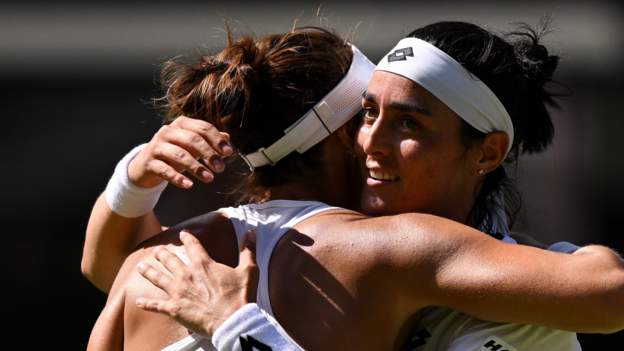
Tunisian third seed Ons Jabeur became the first Arab and African woman to reach a Grand Slam singles final as she beat German mother-of-two Tatjana Maria in the last four at Wimbledon.
Jabeur won 6-2 3-6 6-1 against 103rd-ranked Maria, who aimed to become the lowest-ranked woman to reach the final.
The pair are good friends but were rivals on Centre Court, sharing a long and loving embrace at the net.
Jabeur, 27, will face Simona Halep or Elena Rybakina in Saturday's showpiece.
The contest between Romanian 16th seed Halep, the 2019 champion, and Kazakhstan's Rybakina follows Thursday's first semi-final at the All England Club.
Jabeur, ranked second in the world, reached her first major final with a hard-fought win over 34-year-old Maria, who the Tunisian describes as her "BBQ buddy" and has stayed with at her Florida home when she plays in Miami.
Maria only gave birth to her second child Cecilia last year, and has defied the odds in a remarkable run to the Wimbledon semi-finals.
But after fighting back to force a decider, Maria was unable to handle Jabeur's improved level as her fairytale run ended.
"It is a dream come true after years and years of work and sacrifice," said Jabeur.
"I'm really happy it is paying off and now there is one more match to come."
Jabeur's story is one of an inspirational late bloomer who lacked patience in her younger days before finding the right mentality to complement her talent.
That has seen her win WTA tournaments, rise up the rankings and regularly break down barriers.
Known as the 'Minister of Happiness' in her country, Jabeur is a popular figure in Tunisia, the Arab world and Africa as she continues to be a trailblazer.
"I'm a proud Tunisian woman here today and I know in Tunisia they are going crazy right now," she said.
"I try to inspire as much as I can and I want to see more Arab and African players on the tour."
Jabeur digs deep to win compelling contest
On the basis of their rankings, Jabeur was the overwhelming favourite - and that eventually was borne out in a compelling contest.
Both players have a similar style, keen to often use their slice and play with variety, and it made for an entertaining match.
After an edgy start by both players, Jabeur's extra quality shone through in the first set.
Immediately Maria's serve came under pressure in an eight-minute opening game, the German eventually holding after seeing off two break points.
However, she was unable to withstand more pressure in her next service game and Jabeur moved into a lead she would not relinquish in the opening set.
The third seed appeared to be cruising towards a routine win when she earned two more break points in the second game of the second set.
But Maria saved those and it sparked a switch of momentum.
Perhaps it should not have been surprising considering Maria had fought back from a set down in three of her previous five matches - including her quarter-final win over fellow German Jule Niemeier.
Maria decisively broke in the fourth game and, after failing to break again for the set in the eighth, served it out to the delight of the 15,000 fans who were desperate for the action to be prolonged.
Ominously for Maria, Jabeur's level returned at the start of the decider.
Jabeur broke for a 2-0 lead with a forehand passing winner, and from there she coasted to a victory which she said would leave her fellow Tunisians "celebrating like crazy" back home.















 Phone: (800) 737. 6040
Phone: (800) 737. 6040 Fax: (800) 825 5558
Fax: (800) 825 5558 Website:
Website:  Email:
Email: 






